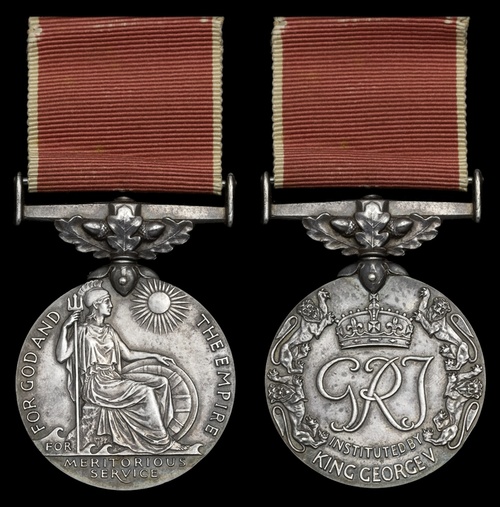
Auction: 25001 - Orders, Decorations and Medals
Lot: 371
The 'Grimsby Blitz' B.E.M. awarded to Fire Guard A. R. Gordon, Grimsby Firewatching Organisation, for his bravery in the raid of 13-14 June 1943 in which the Germans for the first on Grimsby deployed their 'butterfly bombs', anti-personnel bomblets intended to target civilians
British Empire Medal, Civil Division, G.VI.R. (Alexander Ross Gordon), naming officially engraved upon a pre-prepared field, edge mark otherwise very fine
B.E.M. London Gazette 5 November 1943, the original recommendation states:
'During an air raid, incendiary bombs fell around the building where Gordon was on duty.
Under his direction, fires in adjoining buildings were tackled and great efforts made to prevent the flames from spreading.
When the water supply temporarily failed, Gordon salvaged important documents and carried them to safety. By this time the building was ringed with fire, but although tense, Gordon continued to fight the fires and eventually they were subdued.
Gordon showed courage and it was due to his energy and leadership that the building was saved from destruction.'
Alexander Ross Gordon was born at Grismby, Lincolnshire on 23 January 1902, the son of Alexander and Jenny Foster of 79 Hilda Street, Grimsby. He is listed as a member of the A.F.S. or Auxiliary Fire Service on the 1939 census while working as a cost clerk with Consolidated Fisheries Ltd.
Leaving the A.F.S. upon its termination he instead joined the local fire watching organisation as a fire guard. He was on duty on the night of 13-14 June 1943, at his employer's building when the bombs began to drop. The German plan involved dropping large numbers of high explosive and incendiary bombs. In the chaos that followed they also dropped as many as 2000 butterfly bombs, which would target the Civil Defence response and any civilians who might be in the area giving aid as well.
At the Consolidated Fisheries building an incendiary struck home, causing a major fire to break out. Gordon rallied the other firewatchers and they manned the hydrants turning them on the building and the others around it.
A local newspaper goes into greater detail on Gordon's heroics, stating:
'When there was an interruption in the supply of water and the premises seemed certain to catch fire, he organised his helpers and removed from the premises the firm's books and documents. When the water supply was restored, he and his men resumed fire fighting.
Forty-one, married, Mr. Gordon was a volunteer in the A.F.S. until it was transformed into the N.F.S.
"What I learned there stood me in good stead." He said today, "and the three regular firewatchers, though elderly men, worked splendidly as a team."
Premises all round were destroyed by fire, but the buildings of the Consolidated Company, apart from a hole made by one bomb, escaped serious damage through the men's devotion to duty.'
Despite the damage and horrific death toll Gordon performed admirably with the recommendation from the Chief Constable of Grimsby noting his 'Devotion to Duty and Firefighting…'. In the event the raid claimed 114 lives, large numbers of them being civilians killed after the all-clear was sounded by the butterfly bombs. The cost was so high that the Government initially censored the figure for the sake of moral.
Surviving the raid Gordon was honoured for his part in it and went on to become a fish salesman in Grimsby. He died on 22 October 1978; sold together with copied research.
Subject to 20% VAT on Buyer’s Premium. For more information please view Terms and Conditions for Buyers.
Estimate
£400 to £600
Starting price
£320




